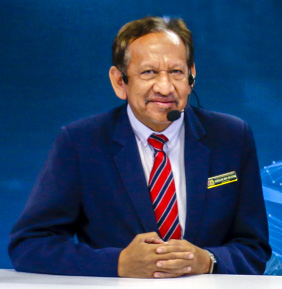The halal issue of vaccines should not be disputed, as most of the Covid-19 vaccines are animal origin free
President of the Malay sian Pharmaceutical Association Amrahi Buang said the halal issue of vaccines should not be disputed, as currently, most of the Covid-19 vaccines are animal origin free, with some of them being certified halal by some countries.
“As such, we can ascertain the vaccine is halal, the next step is to introduce the halal certification … if we do that, it is better, and this can be done by Pharmaniaga or Duopharma which are responsible for obtaining and supplying the Covid-19 vaccine doses for the country,” he said in the programme Koresponden, which was aired on Bernama TV recently.
He said the Pfizer Covid-19 vaccine, sold under the brand name Comirnaty, for example, is developed using a new technology, known as the messenger ribonucleic acid (mRNA), and is animal origin free.
As for the Covid-19 vaccine produced by a Chinese pharmaceutical company, Sinovac, he said, it had been certified halal by the Indonesian Ulama Council, with authorities from the republic having gone to China to see for themselves the contents of the vaccine.
Quality, safety and effectiveness
He said Minister in the Prime Minister’s Department (Religious Affairs) Datuk Seri Dr Zulkifli Mohamad Al-Bakri recently informed that the Special Muzakarah Committee of the National Council for the National Council for the Islamic Religious Affairs, which convened its meeting last Dec 3, had agreed that the use of the Covid-19 vaccine is compulsory (wajib) for groups that have been identified by the government and permissible (harus) for others.
Amrahi said it is illogical to say that the Covid-19 vaccine that will be used in the country is not safe as the safety aspects of taking the Covid-19 vaccination have always been given priority by the government.
“Any vaccine that is brought into the Malaysian market, it must be registered and approved by the National Pharmaceutical Regulatory Agency (NPRA) … whereby, in the registration process, three things have to be complied with, namely quality, safety and effectiveness.
“Like any medicines, including vaccines, when it enters the body, the acceptance and response of every individual is different … that is why, monitoring of the side effects is necessary and it should be reported to the NPRA if there are adverse effects of the vaccine,” he added.


The halal issue of vaccines should not be disputed, as currently, most of the Covid-19 vaccines are animal origin free, with some of them being certified halal by some countries, said Amrahi Buang.
As long as they get necessary regulatory approval, seems to be safe and adhere to good practices, then Malaysia seems to be capable of being the hub for South-East Asia and other Muslim countries.
– Khairy Jamaluddin
Halal vaccine hub
Meanwhile, Science, Technology and Innovation Minister Khairy Jamaluddin said Malaysia could capitalise on its Covid-19 vaccination efforts by becoming a regional hub for halal vaccines catering to Muslim countries.
He said Malaysia was approached by vaccine producers wanting to position Malaysia as a hub for Southeast Asia and other Muslim markets around the world because its well-regulated and stringent halal certifications, he said at a recent Press conference.
Khairy said among those that have expressed such an interest were Russian sovereign wealth funds, investors from India as well as companies related to vaccine producers in China. Investments in that area, he said, would boost Malaysia’s pharmaceutical and biotechnology industry.
However, any company looking to invest and set up a base in Malaysia would first need to get approval from the NPRA.
“As long as they get necessary regulatory approval, seems to be safe and adhere to good practices, then Malaysia seems to be capable of being the hub for South-East Asia and other Muslim countries,” he said. — The Health








